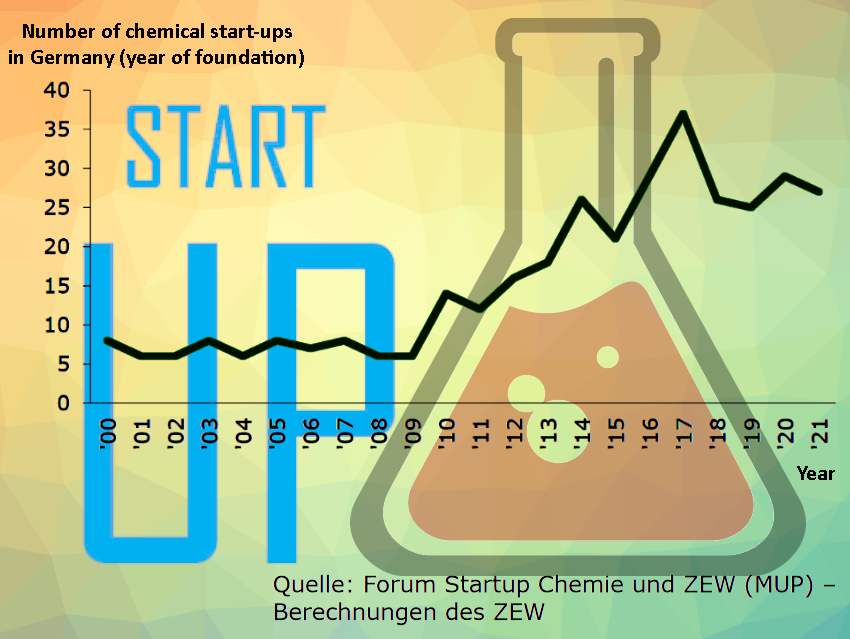A study conducted on behalf of the Verband der Chemischen Industrie (VCI, German Chemical Industry Association) shows that around two-thirds of chemical start-ups in Germany lack funding. Only 0.2 % of total venture capital (VC) investments in Germany go to start-ups in the chemical industry. This is because chemical start-ups have long investment phases of five to ten years, and the investment funds of often more than one million euros per start-up are higher than in other industries. In addition, exit options and target markets are limited.
Of the total VC investments, the lion’s share goes to the IT and biotechnology sectors. These differ from chemical start-ups primarily in the level of investment costs. To be able to produce prototypes or laboratory applications on a large scale, chemical start-ups often need expensive technical equipment and highly qualified employees. In addition, there are high regulatory requirements for the approval of plants and products. For one in three chemical start-ups, the approval processes are an obstacle. Long procedures and the high administrative costs for applications and documentation are a burden on chemical start-ups.
For more than a third of the start-ups, ecological issues are central to their business model. Just under half offer individual sustainable products and services or are working on implementing them. However, start-ups are unable to fully exploit their growth potential against a backdrop of financial scarcity.
To improve growth financing for chemical startups, the study suggests that the start-up strategy of the German Federal Ministry of Economics and Climate Protection must take into account for state VC financing instruments that chemical start-ups face a more challenging starting situation than young companies in other industries. As explained above, these are, in particular, high financing requirements, greater regulation, and long investment periods, which make such start-ups unattractive to typical start-up financiers. Complex regulation and costly approval and licensing procedures should be reduced as far as possible, especially when it comes to innovative products and processes that are urgently needed for climate and resource protection.
In Germany, there are currently around 350 young companies offering innovative products and services based on chemical knowledge and chemical technologies. Between 25 and 30 new chemical start-ups are founded in Germany every year, the report finds.
- Christian Rammer, Marius Berger, Insa Weilage, Vivien-Sophie Gulden, Li Kathrin Rupieper, Birgit Gehrke,
Innovationsindikatoren Chemie und Pharma 2022 – Schwerpunktthema: Chemie-Start-ups,
Studie im Auftrag des Verbandes der Chemischen Industrie e. V., Leibniz-Zentrum für Europäische Wirtschaftsforschung GmbH Mannheim (ZEW) und Center für Wirtschaftspolitische Studien (CWS), Leibniz Universität Hannover, Germany, Oktober 2022.
(accessed October 31, 2022)




